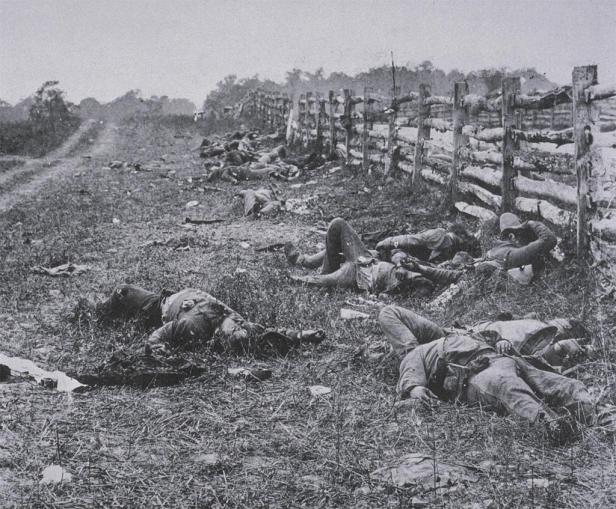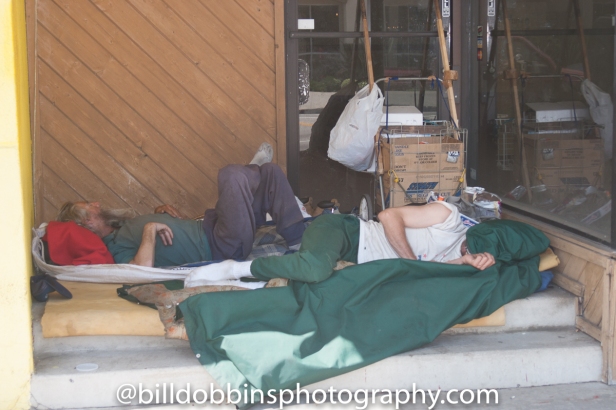FOCUSING ON THE HOMELESS
Photos that show they are human beings, not just statistics.
By Bill Dobbins
www.billdobbinsphotography.com
Almost from the beginning, photography has been used to record and document social and historical problems and realities. Until
Mathew Brady and his colleagues photographed the Civil War with the permission of Abraham Lincoln, few in the general public had any idea what death and carnage on the battlefield actually looked like. These photos were so powerful that few wanted to look at them for decades after the war ended and Brady could not make commercial use of these images and eventually went bankrupt.
 Thanks to the efforts of Mathew Brady and his associates, for the first time in history the public was able to see what war and the resulting death was really like. | Source: https://bit.ly/2P6nWnI
Thanks to the efforts of Mathew Brady and his associates, for the first time in history the public was able to see what war and the resulting death was really like. | Source: https://bit.ly/2P6nWnI
Documentary photographers have had a profound effect on creating awareness about a variety of social ills and injustices.
Augustus Fredrick Sherman worked at Ellis Island during the period in which the fictitious
Vito Corleone would have arrived in the United States. Sherman used a camera to record these new immigrants in a way that humanized them and made viewers see them as individuals rather than stereotypes.
Louis Hine’s photographs illustrating the terrible consequences of child labor helped to motivate lawmakers to end that practice.
 Lewis Hine’s photos helped inspire legislation against child labor. Photo by Lewis Hine.
Lewis Hine’s photos helped inspire legislation against child labor. Photo by Lewis Hine.
When
Jacob Riis used flash technology to illuminate life in squalid slums he helped educate the public to the desperate circumstances of a class of Americans they would otherwise have been almost totally unaware of.
 In the tenements entire families would live in one room. Sometimes more than one. Photo by Jacob Riis
In the tenements entire families would live in one room. Sometimes more than one. Photo by Jacob Riis
Once magazines like Life began to publish they often contained documentary photos that helped reveal a whole range of social problems as well as individuals who were heroically trying to provide solutions to these problems. One outstanding photographer who contributed to this wad
W. Eugene Smith, whose photo essay including everything from documenting the plight of children poisoned by the discharge of heavy metal in Japan to the life of a hard-working country doctor.
 Few photographers have ever pursued documenting a subject with the focus and tenacity of W. Eugene Smith. Ironically, many vintage journalistic photos have become best sellers in the fine art photo market. ©W. Eugene Smith – Black Star
Few photographers have ever pursued documenting a subject with the focus and tenacity of W. Eugene Smith. Ironically, many vintage journalistic photos have become best sellers in the fine art photo market. ©W. Eugene Smith – Black Star
Nowadays, the task of providing this kind of documentary coverage has largely been taken over by television – which often includes still photographs in its broadcasts. But the still photograph continues to be important. For example, literally billions of photos have been uploaded to the Internet. There have been more photos taken and shared in just the last few years than in all of the previous history of photography combined.
Even though I shoot video as well, I have always had an affinity for the still photo. And I like to go out with a camera and simply document the world I see around me. I live and spend a lot of time around the beach areas of Venice, Santa Monica and Marina Del Rey and have noticed for a long time the proliferation of homeless on city streets. Given the Southern California climate, people living on the streets have an easier time than in many other locations. But spending any time among these people it becomes obvious how difficult, extreme and hazardous it is to be homeless no matter how great the weather might be.





There have been a number of proposals as to how best to deal with the homeless situation in Los Angeles. Other cities have found that actually
providing basic housing for these people ultimately saves money compared to the current cost of social services – and when they are able to stay clean and cook and have a save place to store their belongings they have a much better chance of eating well, staying healthy and of being able to find jobs.
But in the meantime, these people exist and are struggling to simply exist. I like to share the photos I take of street people and the homeless to help raise awareness of their situation and, like documentary photographers have done in the past, remind others that these people are human beings, not just statistics.

 Road buddies
Road buddies

**********************************
Bill Dobbins is a veteran photographer and videographer located in Los Angeles who has exhibited his fine art images in two museums and a number of galleries and has published eight print and 16 eBooks, including two fine art photo books:
WEBSITES
 The haves and the have not.
The haves and the have not.

 Dog’s best friend.
Dog’s best friend.









 There have been a number of proposals as to how best to deal with the homeless situation in Los Angeles. Other cities have found that actually providing basic housing for these people ultimately saves money compared to the current cost of social services – and when they are able to stay clean and cook and have a save place to store their belongings they have a much better chance of eating well, staying healthy and of being able to find jobs.
But in the meantime, these people exist and are struggling to simply exist. I like to share the photos I take of street people and the homeless to help raise awareness of their situation and, like documentary photographers have done in the past, remind others that these people are human beings, not just statistics.
There have been a number of proposals as to how best to deal with the homeless situation in Los Angeles. Other cities have found that actually providing basic housing for these people ultimately saves money compared to the current cost of social services – and when they are able to stay clean and cook and have a save place to store their belongings they have a much better chance of eating well, staying healthy and of being able to find jobs.
But in the meantime, these people exist and are struggling to simply exist. I like to share the photos I take of street people and the homeless to help raise awareness of their situation and, like documentary photographers have done in the past, remind others that these people are human beings, not just statistics.


 **********************************
Bill Dobbins is a veteran photographer and videographer located in Los Angeles who has exhibited his fine art images in two museums and a number of galleries and has published eight print and 16 eBooks, including two fine art photo books:
**********************************
Bill Dobbins is a veteran photographer and videographer located in Los Angeles who has exhibited his fine art images in two museums and a number of galleries and has published eight print and 16 eBooks, including two fine art photo books:










